1. Graeme Langlands
2. Clive Churchill
3. Johnny Raper
3. Arthur Beetson
5. Bob Fulton
6. Reg Gasnier
7. Duncan Thompson
8. Herbert Henry Messenger
9. Ken Irvine
10. Peter Sterling
"Changa"
Position: Fullback
Junior Club: Dapto (Wollongong)
Senior Clubs: St George
Tests: 34
Seasons: 13
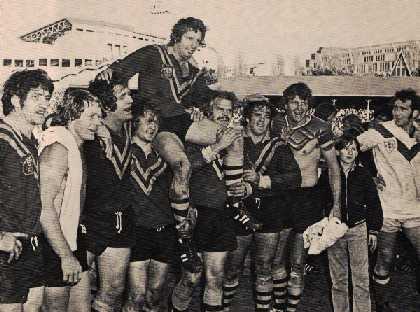
Langlands was the last great player brought to St George by Frank Facer, the architect of the 11 consecutive Dragon premierships. He was a super competitive master, who possessed a unique ability to perform freakish acts on a football field. In the 1964 grand final, he fielded a kick near halfway by leaning over the touchline and controlling the ball with his fingers. He set off on a diagonal run which resulted in a try to John King in the corner. Langlands was the goalkicker in the last 4 St George premierships of the era, and this facet of his play ended up netting him a remarkable 1554 premiership points, including being top scorer in 1971 with 171 points. Langlands was the first player to post over 100 points against Great Britain. Such was his freakish ability that a try against France was once disallowed because the referee couldn't believe that he could possibly have been onside. He captain-coached the victorious 1973 Kangaroos, and the St George grand final sides of 1971 and 1975. His greatest moment, however, was the 1974 third test against Great Britain at the SCG, when Langlands brilliance inspired Australia to an Ashes winning 22-18 win. Langlands was chaired off the field to the sound of the packed crowd chanting "Changa, Changa". is contribution to St George was enormous. Being one of the few greats of the Dragons to stay on after their great era had ended, Langlands constantly carried the weight of his clubs attacking abilities. Such was Saints reliance on Changa that, when a pain killing injection went wrong in the 1975 grand final, rendering his left arm limp and useless, the Dragons fell in a heap. Conceding 30 points in the second half, Saints were belted by Easts 38-0, which remains a record grand final loss. Such was the enormity of Langland's plight, rumours of superstition sprang from the loss, centering around his new white boots. No player wears white boots to this day, due to a fear of being sapped of all ability. Langlands ended his career in 1976, after 227 games with the Dragons, and second only to Eric Simms as the greatest point scorer of all time. In 1999, he was belatedly but justly bestowed the title of "Immortal".
"The Little Master"
Position: Fullback
Junior Club: Merewether (Newcastle)
Senior Club: South Sydney
Tests: 34
Seasons: 12
Churchill was only a small, wiry player, in a time when the code was ruled by the big and brutal. Despite this, he was a master running fullback, with a uniquely deceptive sidestep, brilliant hands, and a quick turn of pace. These qualities were enough to mesmerise the opposition players and the general public during the '50. Despite not being captain of Souths (Jack Rayner held that position), he was Australia's test captain for a record 26 appearances, including the historic Ashes victory in 1950. He also played 99 consecutive rep games, a current record. In one particular heroic day, Churchill played with a broken arm wrapped in a cover of an excercise book. This was a match against Manly in 1955, a match that Souths needed to win to make the semis. In the dying moments, Churchill waved aside the protests from his team mates to pot a gola from the sideline to give them a 9-8 win. Souths went on to win the premiership. He finished his career as coach of the premiership winning sides of 67/8 and 70/1. The Churchill Stand at the Sydney Cricket Ground, and the Clive Churchill Medal (for the best player in a grand final), and the title of Rugby League Immortal all honour the Little Master.
"Chook"
Position: Lock
Junior Club: Revesby (Canterbury junior)
Senior Clubs: Newtown, St George
Tests: 33
Seasons: 13
Raper was a Canterbury junior who joined Newtown in 1957, after being supplied a false address to avoid the residential rule. After 2 seasons, he joined the champion St George side and stayed there for 11 seasons. Raper was a full throttle player. He was a dynamic runner, with a gift for both support play and playmaking, as perfected the art of cover defence. He was an unstoppable force in the Dragons record premiership march, and despite a mass retirement of players at the dream run's end in 1966, stayed on until 1970 as captain coach. He was inspirational in test football, and his game in the 2nd Test in 1963 was arguably the finest game anyone has ever played. Raper cut Great Britain to shreds with his multipule attacking skills, as the Kangaroos notched up a record 50-12 win. He was rewarded with test captaincy for the 1967 tour. He spent his later years playing in Newcastle, and is currently a NSW and Australian selector, and a Rugby League Immortal . 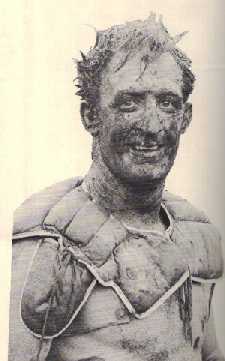
"Big Artie"
Position: Prop
Junior Club: Roma
Senior Clubs: Redcliffe, Balmain, Eastern Suburbs, Parramatta
Tests: 11
Seasons: 16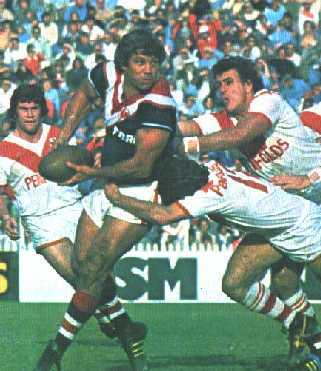
The greatest prop of all time started out as a center with Redcliffe in 1965. By the time he joined Balmain in 1967, his hatred of training and love of pies had seen him end up in the front row. Even without his fitness, his combined aggression and brilliant ball skills were enough to see him in a test jumper against England for the 3rd test in 1967. Despite only playing half a game, his debut 40 minutes saw him set up 2 tries and a victory for the Australians, and subsequently earned the nickname 'half a game Artie'. Suspension forced him to miss the brilliant 1969 Balmain premiership win, but his efforts for the Tigers earned him the reputation as the best attacking prop in the world, and a hefty contract with Eastern Suburbs in 1971. He made the 1973 Kangaroo tour, and having become a more committed player, left the Poms in awe of his ability to slip a pass from impossible positions. He was named captain against France, thus becoming the first Aboriginal Australian to captain his country in any sport. The following year 1974 Jack Gibson had arrived at Bondi Junction, and he and Beetson forged a partnership that brought the first premiership to the Roosters in 30 seasons. Beetson's role in the 19-4 win over Canterbury was again inspiring, but in 1975, Beetson was simply unstoppable. With speedsters like Russell Fairfax, Bill Mullins and Mark Harris living on a diet of Beetson passes in the centre of the ruck, the Roosters smashed all opposition, won the Amco Cup, and the premiership. 1975 is more remembered for Greame Langland's white boots, but it was Beetson brilliance that inspired the biggest grand final flogging of all: 38-0. He spent his twilight years at Parramatta, where the skills he passed to the clubs brilliant junior crop were invaluable in capturing 4 premierships in the 80's. Beetson's final year will be remembered for 3 things: leading Queensland in the first ever State of Origin match (and at 36, playing an awesome match), bursting through the St George backs in a desperate attempt to get Parramatta the victory it needed to make the semis in his final ever first grade game, and the huge look of pride as he was chaired off the SCG, victorious in his final match, as skipper of the 1980 Reserve Grade premiers. He has since coached Cronulla, Easts, Queensland and Australia, and is now a Queensland and national selector .
"Bozo"
Position: Five-Eight
Junior Club: Corrimal (Wollongong)
Senior Clubs: Manly Warringah, Eastern Suburbs
Tests: 19
Seasons: 15
The young Bob Fulton burst on the scene in 1966 as a young whiz kid recruit for Manly. He made is NSW debut that year, and made his Australian debut in the World Cup of 1967. A quick thinking schemer, with a quick, darting game that was almost impossible to round up, he was given the captaincy of the City Firsts side at the age of only 19 in 1968. Shortly after his 20th birthday, he was awarded the ultimate accolade for a young man, when named captain of the Sea Eagles side in the grand final against Souths. Despite inciting a second half comeback, Manly went down in a thriller 13-9. History repeated itself in the bloody 1970 grand final, where 2 Fulton field goals were not enough to secure victory. Brighter days were ahead, however. He played a leading role in the clubs maiden win in 1972, and was the man of the match in the bloodbath that was the 1973 grand final. That year he made his Kangaroo debut, and was a permanent fixture in the No 6 test jumper for years. He was the competition's top tryscorer in 1972, 73 and 76. In 1976 he captained Manly to their nail biting 13-10 win over Parramatta in the grand final, and them promptly joined Eastern Suburbs, where he played out his career. He led the 1978 Kangaroos to a victorious tour of the UK, and was captain in the 2 lost Tests to France (the last Aussie captain to lose a test series). As captain coach of Easts, injury forced his playing retirement, and he began an enourmously successful coaching career in 1980, guiding the Roosters to their last ever grand final. He returned to Manly in 1983 to see Manly lose to Parramatta, but these years merely encouraged him to better things. His brilliant tactics in the 1987 grand final (the use of the head bin with Ron Gibbs ushered in the era of unlimited interchange, and he also gave Cliff Lyons a licence to run at will) gave Manly premiership No. 5. This was followed up with another premiership (1996), 2 successful Kangaroo Tours (1990 and 1994), and probably his finest coaching triumph: molding together a Test side decimated after the Super League war that ended up flogging New Zealand in 3 tests and winning the World Cup in hostile circumstances in England in 1995. Bob Fulton remains the only Manly player to notch over 100 tries, and the only man ever to play, captain and coach winning premiership sides and Kangaroo Tours. Finally, in 1999, after 34 seasons serving Rugby League, he retired. He was named an Immortal in 1983 . 
"Puff"
Position: Centre
Junior Club: St George
Senior Clubs: St George
Tests: 36
Seasons: 8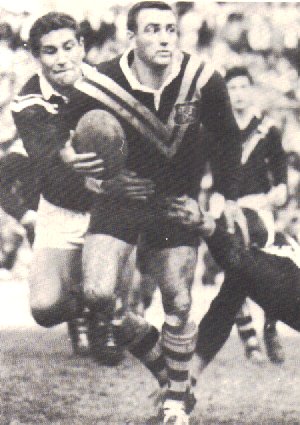
Graded by St George in 1959, the 18 year old Gasnier burst onto the scene as a brilliant attacking center whose speed, step and swerve rendered him virtually unstoppable. His 8 seasons coincided with the last 8 of St George's golden run, although he missed the 1959 and 1966 wins through injury. He scored 3 tries on his debut for NSW, and also 3 tries on his test debut against New Zealand. He made his first Kangaroo Tour (of 3) also that year, and scored 3 tries on his debut against Great Britain as well. In his first year, he had scored 14 tries in rep football. In 1960 he was the leading try scorer with 25 tries, 3 of those in the grand final (against Easts). By 1962, as a 22 year old, he was captain of Australia. He scored 5 test tries on the 1963 Kangaroo Tour, after topping the premiership try scoring list with 22 tries. His 18 tries in 1964 saw him top the list again. His career carried on in much the same fashion until, captaining Australia on the 1967 Kangaroo Tour, he broke his leg in the first test. After an attempted return against Avignon on the French leg of the tour, he announced a shock retirement at age 28. At the time, he was (with Clive Churchill) the most capped Australian Rep player, and had scored 127 tries from 115 games with St George. He was voted as one of the original 'Immortals' in 1982 .
"The Downs Fox"
Position: Halfback
Junior Club: Toowoomba
Senior Clubs: Ipswich, North Sydney, Toowoomba
Tests: 9
Seasons: 7
After spending a few seasons with Ipswich in the Brisbane competition, Thompson represented Queensland in 1915 for the first time. Nicknamed the "Downs Fox" after his native Darling Downs area of Queensland, Thompson was signed by North Sydney in 1915. However, the lure of adventure and duty led him into service as an ANZAC, and 2 years in the hell of the trenches in France. He was shot in the chest in Dernancourt in 1917, and lost his right lung as a result. Upon repatriation in Australia, however, he was keen to resume his league career, which he did in Ipswich. His disability led him to remodel his game. His goal was to get as much done for the least exertion of energy, and thus became the first halfback to act as ball playing attack directing general, while barking at his forwards for total effort. This was coupled with a new philosophy of the game, which he called 'contract football' The contract was between 2 players: the ball carrier and reciever. The contract was broken when the ball was dropped. The result was series of chain passing manoeuvres which would result in free flowing football, and tries. He was rewarded with a test debut against New Zealand in 1919, and another chance with North Sydney. He won the man of the match in the second Ashes test in Brisbane in 1920, which won Australia the Ashes for the first time on home soil. Having graduated to captain of the Shoremen, he was the brains and spark that fired the brilliant North Sydney backline of 1921. Thompson's contract football earned a place for Norths star studded threequarter line of Blinkhorn, Peters, Rule and Horder on the 1922-23 Kangaroo tour (the only time a full club threequarter line ever toured). The result was Ashes success, and still standing records of 39 and 35 tour tries for Blinkhorn and Horder respectively. The 1922 season carried on in the same fashion, and Thomspn was supreme in Norths' finest ever moment, the 35-3 flogging of Glebe in the final that won the premiership. However, he quit Sydney in 1923, disillusioned after being suspended for 12 weeks after being mistakenly sent off for kicking an opponent. He returned to captain the Toowoomba Clydesdales, and led Queensland to their first ever victories over NSW in 1924 and 1925. In 1925, he led Toowoomba to the high honour of undefeated world champions. After winning the local Darling Downs premiership, The Clydesdales under Thompson beat Ipswich, Brisbane, South Sydney (reigning Sydney Premiers), Victoria, NSW, New Zealand and England! Thompson's contract football is the basis of modern free flowing football today, and is the basis of the coaching philosophies of current Broncos coach Wayne Bennett . 
"Dally"
Position: Center
Junior Club: East Sydney (Rugby Union)
Senior Clubs: Eastern Suburbs
Tests: 8
Seasons: 5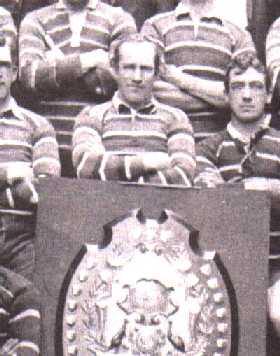
A short, stocky man, Dally Messenger was a champion rower and test centre for the Wallabies at the time of the formation of Rugby League in 1907/8. His hard running, hard tackling game, and prolific goal kicking made him a hugely popular sportsman, when James J Giltinan approached his mother to allow him to turn professional and join the newly formed Eastern Suburbs club. Mesenger captained Australia in the formative test against the New Zealand All Golds. He captained Australia in the first ever Ashes test in 1908 and top scored on the tour with 155 points. He held the job until the end on the 1910 Ashes campaign, when he retired from representative football to concentrate on his club football with Easts. Here, the real legend of Dally M was born, as his presence was essential in netting the club 3 straight premierships from 1911-1913. In 1911, he scored a massive 270 points, which has only been bettered 5 times since. His goalkicking in the 1911 final against Glebe was supurb, with one reporter claiming that 'his kicks were drawn to the posts like magnets'. The following year, he again added to the Dally M legend, with a massive 65 yard penalty goal in the last minute of a game against Souths, which gave Easts a 9-7 win. This kick is the longest recorded place kick for goal in Rugby League history. Messenger retired in 1913, the year Easts were permanantly awarded the first ever premiership trophy: the RAS Shield. Easts promptly awarded it to Messenger. Today, the official award to the season's best player is so named after this great pioneer: the Dally M Award .
"Mungo"
Position: Wing
Junior Club: Mosman (North Sydney junior)
Senior Clubs: North Sydney, Manly Warringah
Tests: 31
Seasons: 16
The young Ken Irvine was an aspiring sprinter of such talent that he was in the running for selection for the 1960 Olympic squad, but chose to pursue a career with Rugby League. After a handful of games, he was chosen (alongside Reg Gasnier) in the NSW emerging side, before being 'signed for life' by excited North Sydney boss Harry McKinnon in 1958. Irvine was pure, raw speed. He held the world professional sprint record in 1961 (100yds in 9.3 seconds). His point scoring records speak for themselves. He holds the record for the most ever premiership tries (212), the most ever test tries (33), and the most ever interstate series tries (28). His club record 171 tries for the Bears makes him their greatest ever junior, and he was also a top goalkicker as well. He made 3 Kangaroo Tours, and kicked the winning goal in the 18-17 win in the third test against Great Britain in 1962. After scoring a last minute try in the corner, Irvine lined up the conversion. he referee, Darcy Lawler, then whispered to him "You'll never kick a goal like that, son". Irvine adjusted the kick and landed the match winning goal! After 13 brilliant seasons with Norths (including captaining the side in a walk off against Canterbury in protest against their cheating tactics), he joined neighbours Manly, where he won 2 deserving premierships in 1972/3. He retired after the 1973 grand final, having earned a still valid reputation as the best winger to wear the green and gold. Sadly, Ken Irvine died of leukemia when he was just 50 years old . 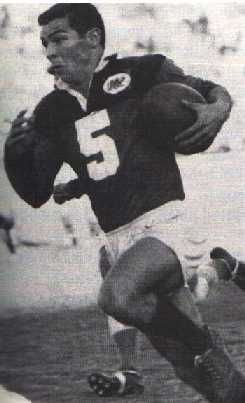
"Sterlo"
Position: Halfback
Junior Club: Wagga Kangaroos, Fairfield Patrician Brothers
Senior Clubs: Parramatta, Hull
Tests: 18
Seasons: 15
Legend has it that at the birth of Peter Sterling in Toowoomba, the doctor made comment about the large lump of new born baby. "Mrs Sterling", he started, "one day he'll play for Australia!". The first big step in toward fulfilling this destiny was the day Parramatta coach Terry Fernley drove to Wagga to lure him into the Eels juniors. A scholarship with Fairfield Pats was awarded, and in that year, 1978, Sterling won the player of the series award in the Commonwealth Bank Cup, after captaining the school to victory. He then made his first grade debut in the semi final against Many, at fullback, which they Eels lost under controversial circumstances. The following year, he made his debut at halfback. Despite a big step (off both feet) and speed off the mark, his greatest satisfaction was putting players through gaps. In his formative years with the Eels, he developed the unique ability to know where every payer on the field was by only looking one side of the ruck. Coupled with a magical kicking game, it was only natural that he made his Origin debut in 1981. That year, he was instrumental in the clubs brilliant grand final win, setting up 4 tries in the 20-11 win over Newtown. He usurped Steve Mortimer as the code's top halfback in 1982, and was the mastermind behind the 21-8 belting of Manly in the 1982 decider. He made his test debut on the Kangaroo Tour, and his partnership with Brett Kenny kept the incumbent Mortimer and Wally Lewis away from test football for the tour. Another premiership in 1983 followed, and he was lured to Hull to spend the 84 and 85 off seasons. Sterling was a noted big match player, and his efforts captaining Hull in the loss to Wigan in the magical Challenge Cup final of 1985 earned him the coveted Lance Todd Trophy. This was followed by the first ever Clive Churchill Medal in the Eels grinding 4-2 win over arch rivals Canterbury in the 1986 grand final. In that game, Sterling was masterful, pumping out majsetic kicks from right in the teeth of the brutal Canterbury forwards, deft passes and timely defence. He captained NSW in the Los Angeles State of Origin in 1987, and was vice captain on the 1978 Kangaroo Tour. Later in his career, with a nagging shoulder injury and a decline in the Eels competetiveness, Sterling took over the Parramatta captaincy. He scored 3 perfect '10' ratings from Rugby League Week, one against Easts at Parramatta Staduim in 1987, another other against Brisbane in 1989, but probably his best ever disply was his first "10" score. This occurred at the round one match of the 1986 season, in the sold out opening of Parramatta Stadium, when the Eels belted previous seasons grand finalists St George 38-6. His list of awards is numerous: Rothmans Medal (the best and fairest player in the Sydney Premiership): 1987, 1990; Dally M Player of the Year 1986-7; Clive Churchill Medal 1986, Lance Todd Trophy 1985, Adidas Golden Boots award (best player in the world) 1989. His career ended sadly in 1982, when his shoulder gave way for the last time in a big tackle by Wests' prop David Gillespie. After 229 brilliant performances for Parramatta, he announced his retirement. Today he has a successful media career with Channel 9, as a commentator and a co-host of the Footy Show .